In mid-November, the city of Collegedale lifted a self-imposed sewer moratorium that was passed in 2016.
"[Lifting the ban] is a really big deal," City Manager Ted Rogers emphasized following Public Works Director Eric Sines' report during the board of commissioners' agenda workshop Nov. 25.
The city imposed the moratorium following consistent overflow problems caused by both city-wide growth and sewage from the Hamilton County Water and Wastewater Treatment Authority flowing into the city's lines. According to the Environmental Protection Agency, overflows can be caused by too much rainwater and groundwater seeping into the system, leading to the release of raw sewage and possibly backing up into homes.
The self-imposed moratorium limited the number of new sewer lines that could be added in the area.
Despite the restrictions, Sines said the city worked to ensure that no new developments or projects were turned away. In the years during the moratorium, the city added several new restaurants, new residential buildings and a hotel, for example. And in preparation for the WWTA connecting to a new force main linked to Chattanooga's collection system - while also allowing for new customers in the fast-growing area surrounding Collegedale - the WWTA moratorium was lifted in 2018.
Collegedale has been working with the WWTA as well as the city of Chattanooga to ensure it is on track to reduce its own overflows. Sines reported that both entities were "pleased" with the work Collegedale has done to correct its issues.
The city has undertaken several significant sewer rehabilitation projects, including lining 101 manholes to reduce overflows and scoping out about 20% of the city's system for defects. Sines said Collegedale is lucky because its system is relatively new. The oldest lines the city owns are from the '70s, he said.
In 2012, the EPA placed neighboring Chattanooga under a consent decree to restore, repair and replace its aged sewer system - which included wooden and brick lines in the oldest sections of the network. At the time, the city estimated its overhaul would cost about $250 million.
Sines estimates that in a given year, Collegedale spends about $180,000-$300,000 on routine rehabilitation of the system, while also keeping an eye on preparing for the future. This past year, the city budgeted $2.2 million for a project on Apison Pike that will upsize the existing mainline near Veterans Memorial Park, taking it from its current 15-18 inches up to 36-42 inches to allow for more volume.
"We are being proactive with our system," Sines said.
Email Sabrina Bodon at sbodon@timesfreepress.com.
